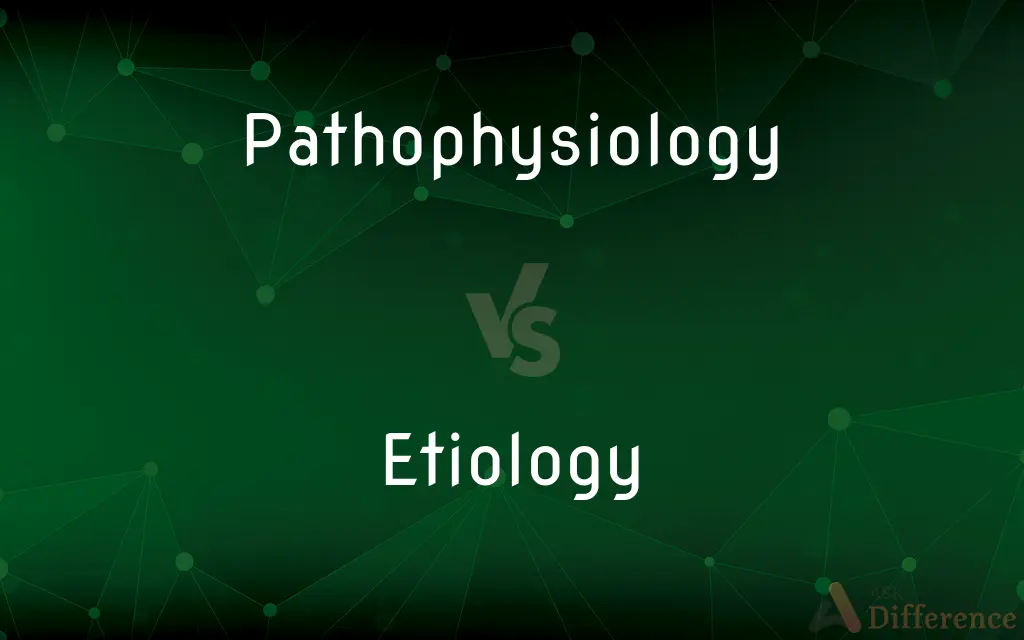Pathophysiology vs. Etiology — What's the Difference?
By Tayyaba Rehman & Fiza Rafique — Updated on September 12, 2023
Pathophysiology focuses on the abnormal functioning of organs or systems in disease conditions. Etiology studies the causes or origins of diseases.

Difference Between Pathophysiology and Etiology
Table of Contents
ADVERTISEMENT
Key Differences
Pathophysiology deals with understanding the altered physiological processes that occur due to diseases or medical conditions. In medical science, pathophysiology is often the basis for diagnosis and treatment. Etiology, on the other hand, examines the underlying causes or origins of diseases, such as bacteria, lifestyle choices, or genetic factors. It helps identify what initiates the disease process.
In a clinical context, pathophysiology explains the "how" — it describes how diseases manifest in the body, affect organs, and lead to symptoms. Etiology answers the "why" — it seeks to uncover the factors that initiate or trigger the disease in the first place. Both are important for medical professionals; pathophysiology guides treatment strategies, while etiology informs prevention.
Pathophysiology often involves detailed analyses at the molecular, cellular, and systemic levels. It can be quite complex, explaining the steps and changes that occur in bodily systems during disease states. Etiology can be equally complex but focuses on identifying the agents or conditions that lead to the disease. It can be subdivided into categories like infectious etiology, genetic etiology, and environmental etiology.
Both pathophysiology and etiology are essential in research settings, particularly in the development of new medical treatments. Pathophysiology could involve studying the progress of a disease under various conditions, while etiology may involve epidemiological studies to understand how diseases spread or what factors are most responsible for causing them.
Comparison Chart
Focus
Abnormal functioning in disease states
Causes or origins of diseases
ADVERTISEMENT
Importance
Guides treatment strategies
Informs prevention
Level of Detail
Molecular, cellular, systemic
Agents, conditions, lifestyle, genetics
Example Field
Cellular biology, biochemistry
Epidemiology, genetics
Research Importance
Critical in understanding disease mechanisms
Essential in understanding disease spread and prevention
Compare with Definitions
Pathophysiology
Study of abnormal physiological processes.
Pathophysiology aids in understanding how diseases affect bodily functions.
Etiology
Study of the cause or origin of diseases.
Etiology helps us understand why diseases occur.
Pathophysiology
Abnormal functioning due to a disease.
Heart failure changes the pathophysiology of the cardiovascular system.
Etiology
Basis for disease manifestation.
Genetic mutations can be the etiology of many conditions.
Pathophysiology
Underlying physical changes in disease conditions.
The pathophysiology of asthma involves inflamed airways.
Etiology
Source or inception of illness.
The etiology of the outbreak was traced back to contaminated water.
Pathophysiology
Field that explains mechanisms of diseases.
In medicine, pathophysiology is critical for diagnosis.
Etiology
Factors responsible for causing a disease.
The etiology of lung cancer may include smoking.
Pathophysiology
Analysis of dysfunction in medical conditions.
The pathophysiology of diabetes is complex.
Etiology
Reason behind the development of medical conditions.
Viruses are often the etiology behind infectious diseases.
Pathophysiology
Pathophysiology (a.k.a. physiopathology) – a convergence of pathology with physiology – is the study of the disordered physiological processes that cause, result from, or are otherwise associated with a disease or injury.
Etiology
Etiology (pronounced ; alternatively: aetiology or ætiology) is the study of causation or origination. The word is derived from the Greek αἰτιολογία (aitiología) "giving a reason for" (αἰτία, aitía, "cause"; and -λογία, -logía).
Pathophysiology
The functional changes associated with or resulting from disease or injury.
Etiology
The study of causes or origins.
Pathophysiology
The scientific study of such changes. In both senses also called physiopathology.
Etiology
The branch of medicine that deals with the causes or origins of disease.
Pathophysiology
(pathology) The physiological processes associated with disease or injury.
Etiology
Assignment of a cause, an origin, or a reason for something.
Etiology
The cause or origin of a disease or disorder as determined by medical diagnosis.
Etiology
Standard spelling of aetiology
Etiology
The science of causes. Same as tiology.
Etiology
The cause of a disease
Etiology
The philosophical study of causation
Common Curiosities
How does Pathophysiology aid treatment?
Pathophysiology helps healthcare providers understand how a disease affects the body, guiding treatment.
What's the main focus of Pathophysiology?
The main focus is on understanding the abnormal functioning in disease conditions.
What's the main focus of Etiology?
The main focus is on understanding the causes or origins of diseases.
Is Pathophysiology important in research?
Yes, it is critical for understanding disease mechanisms.
How does Etiology help in prevention?
Etiology identifies the cause, helping in disease prevention through lifestyle changes or vaccines.
Is Pathophysiology complex?
Yes, pathophysiology can be complex, involving cellular and systemic changes.
What does Pathophysiology mean?
Pathophysiology is the study of abnormal physiological processes due to disease.
What is Etiology?
Etiology is the study of the causes or origins of diseases.
Can Etiology be environmental?
Yes, environmental factors can be part of a disease's etiology.
Can Etiology involve genetics?
Yes, genetic factors can be part of the etiology of certain diseases.
Does Pathophysiology involve biology?
Yes, it often involves cellular biology and biochemistry.
Is Etiology important in research?
Yes, it helps in understanding how to prevent or control diseases.
Can Pathophysiology be disease-specific?
Yes, pathophysiology often focuses on specific diseases like cancer or diabetes.
Does Etiology involve epidemiology?
Yes, epidemiological studies are crucial in understanding the etiology of diseases.
Can Pathophysiology and Etiology overlap?
They can overlap in research settings, but generally, they focus on different aspects of diseases.
Share Your Discovery

Previous Comparison
Cognoscent vs. Cognizant
Next Comparison
Rarified vs. RarefiedAuthor Spotlight
Written by
Tayyaba RehmanTayyaba Rehman is a distinguished writer, currently serving as a primary contributor to askdifference.com. As a researcher in semantics and etymology, Tayyaba's passion for the complexity of languages and their distinctions has found a perfect home on the platform. Tayyaba delves into the intricacies of language, distinguishing between commonly confused words and phrases, thereby providing clarity for readers worldwide.
Co-written by
Fiza RafiqueFiza Rafique is a skilled content writer at AskDifference.com, where she meticulously refines and enhances written pieces. Drawing from her vast editorial expertise, Fiza ensures clarity, accuracy, and precision in every article. Passionate about language, she continually seeks to elevate the quality of content for readers worldwide.















































